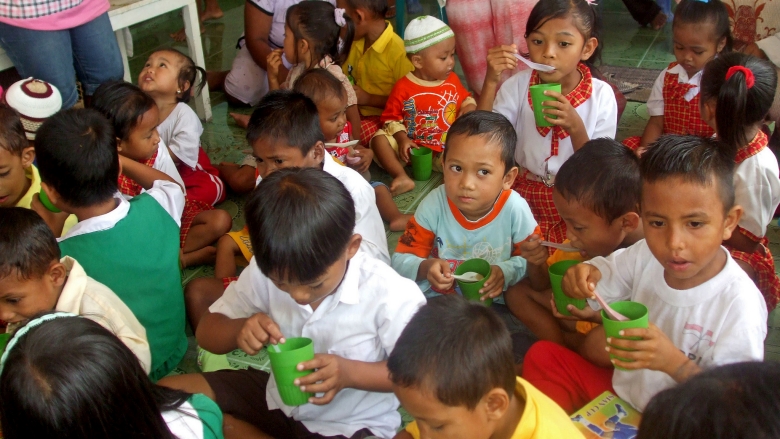The purpose of the visit was to give parliamentarians the opportunity to see first-hand the impact of the work of the World Bank Group (WBG) and the International Monetary Fund in a middle-income country, and learn about the two institutions’ dialogue and collaboration with Indonesian authorities and other development stakeholders. For MPs from borrowing country, the visit offered a platform to exchange views and experiences with their peers on successful development policies. For MPs from donor country, the visit presented an opportunity to see development cooperation in practice.
During the visit, parliamentarians met with several development partners such as the World Bank Group (WBG), the International Monetary Fund (IMF) and the Asian Development Bank (ADB). They also interacted with officials from the Government and relevant Ministries, the House Speaker, civil society organisations and diplomats.
The visit focused on the following key development priorities in Indonesia:
- Macroeconomic success and future opportunities for private sector growth: during meetings with the Indonesian Ministry of Finance and Central Bank and representatives with WBG and IMF officials, the delegation had the opportunity to discuss Indonesia’s macroeconomic positive prospects and challenges. Despite the 2007 financial crisis, Indonesia’s economy proved to be resilient and keeps developing, even though at a slower rate. To overcome the challenges ahead, the country needs a policy framework that can maximize its resources and ensure sustainable development. To do so, the Ministry of Finance committed, with WBG support, to focus its economic strategy on manufacturing and infrastructure to attract investors. Both the WBG and the IMF are working with the ADB on a $4 billion portfolio dedicated to inclusive growth which aims to address important policy reforms on infrastructure, energy security, food security and education. Employment diversification, the reduction of informality and the closing of the skills gap are critical to making the country more competitive in the long term. Tourism also counts among Indonesia’s priorities as it represents today an untapped competitive advantage. The WBG and the International Finance Corporation strive to reinforce all of these sectors to ensure macroeconomic stability and encourage private sector growth, as exemplified by the MBK Ventura microfinance institution which was part of the visit of the delegation.
- Climate change: the delegation was briefed on the environmental challenges faced by Indonesia. In addition to being the fifth largest greenhouse gas emitter, the country suffers from severe deforestation and land management issues which have deleterious impact on local, national, and transnational levels. In parallel, access to energy remains a developmental challenge: 60 million inhabitants still lack access to dependable energy. Renewable energy has met limited success in Indonesia because of the cheap cost of oil and gas. Indonesia can still meet its COP21 commitments if deforestation is prevented and renewable energy encouraged. To take stock of these efforts, the delegation visited the Jakarta River Dredging Project (JUFMP) and the Disaster Risk Agency Centre which both address flood management priorities and drainage systems.
- Inequality: the delegation discussed the challenge of reducing inequality with their peers from the Indonesian Parliament as well as with government authorities and diplomats. Parliamentarians underscored the power of legislation to address this pressing development issue, while government officials cited the need to prioritise key sectors (health, education, social sectors, public-private partnerships, investment...) and ensure price stability to combat inequality. WBG and IMF representatives displayed cautious optimism in Indonesia’s ability to significantly reduce inequality and achieve higher levels of growth. They shared their recommendations on how to get there during informative discussions with the MPs. The delegation also had the opportunity to witness the transformational impact of the PNPM Urban project in improving the human development index of local village communities.
- Public sector reform: public sector reforms were also at the heart of the discussions with MPs. Indonesia has already undergone a series of Reformasi which laid solid democratic foundations and allowed for greater dialogue with international financial institutions. However, there is still room for improvement in the delivery of services - with its implications in terms of decentralization. To reach that goal, Indonesian authorities are currently working on collecting information, determining priorities per portfolios and per islands, and engaging with local governments and MPs. Obstacles to such reforms include corruption and tax collection. The MPs concluded that these two issues will first need to be tackled to allow greater public sector improvements.
Delegates expressed their satisfaction with the visit and appreciated the value of the Parliamentary in the Field programme for providing testimonials, concrete case studies and smart policy choices that can set a country on the path of sustainable growth.
Read the Full Story
